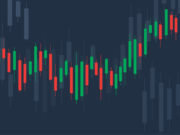Why Retail? Why the Consumer Goods industry? Well, there are a few things to consider:
– Strong spending and purchasing power in the overall retail sector.
– Inflation has decreased from its peak in 2022.
– Consumer spending remained robust in July, with retail sales growing by 0.7%. – The consumer goods market is projected to reach $3 trillion by the end of 2023. – Analysts project a 3.2% rate in annual growth from 2023 to 2028.
We like positive data, and we want sectors that are performing well. That’s absolutely the case here, and we have three stocks in particular that highlight these principles…
Albertsons Companies Inc (ACI)
Albertsons Companies (ACI) stands out as a formidable contender in the retail sector, capitalizing on its commitment to efficient in-store services and elevating digital and omnichannel capacities. ACI is also known for driving enhanced productivity. The ongoing initiatives undertaken by ACI to enrich its range of products consistently elevate the holistic customer journey. Notably, ACI presents a projected long-term earnings growth rate of 8%, further underscoring its potential for sustained growth.
ACI, currently up year-to-date by 6.85%, has a positive 20/200 day SMA (simple moving average), positive year-over-year revenue and momentum growth, a PEG (price/earnings to growth) ratio of 1.63x, and a solid 0.37 beta score. ACI most recently beat analysts’ projections on EPS, reporting $0.93 per share vs. $0.85 as expected (a 9.8% win), and has exceeded estimates for 12 consecutive quarters. ACI has an annual dividend yield of 2.17% and a quarterly payout of 12 cents ($0.48/year) per share. For the current quarter, ACI is expected to post $18.2 billion in sales at $0.62 per share. With a 10-day average volume of 2.5 million shares, ACI has an average price target of $25, with a high of $27.25 and a low of $21, indicating the potential for a 23% jump from its current price. While up YTD, ACI is trading near the bottom of its 52-week range, leaving plenty of room to move in the right direction.
[stock_market_widget type=”accordion” template=”extended” color=”#5679FF” assets=”ACI” start_expanded=”true” display_currency_symbol=”true” api=”yf”]
Unilever PLC (UL)
Based in London, U.K., Unilevel PLC (UL) is a fast-moving consumer goods firm that markets items under renowned brands such as Ben and Jerry’s, Axe Bodyspray, LUX, Seventh Generation, and others. On April 3rd, UL achieved a substantial cloud transition project via partnerships with Microsoft Corp. (MSFT) and
Accenture PLC (ACN). By adopting Azure’s cloud platform, UL has streamlined operations, improving new product introductions, customer support, and overall efficiency. UL also recently disclosed the sale of its Suave brand in North America to Yellow Wood Partners LLC. This divestiture underscores UL’s successful strategy of re-designing its portfolio towards targeted growth sectors.
UL is up slightly year-to-date by 0.41% and is trading around the middle of its existing 52-week price range. With a positive SMA, $7.6 billion in free cash flow, and a 0.51 beta score. Regarding its last earnings call, UL beat analysts’ revenue forecasts by 2% while also reporting year-over-year growth in key areas like revenue (+2.72%), net income (+22.13%), EPS (+25%), and net profit margin (+18.86%). UL has a 3.46% annual dividend yield, a quarterly payout of 47 cents ($1.88/year) per share, and a 62.88% payout ratio.
With a 10-day average volume of 1.93 million shares, UL has a median price target of $58.15, with a high of $68.01 and a low of $41.18; this represents an almost 34% potential price upside.
[stock_market_widget type=”accordion” template=”extended” color=”#5679FF” assets=”UL” start_expanded=”true” display_currency_symbol=”true” api=”yf”]
Edgewell Personal Care Co (EPC)
Oddly, the insider investment in Edgewood Personal Care Co. (EPC) was the first thing I noticed about it. It emphasizes EPC’s alignment with shareholders’ interests, boosting market confidence. With an insider holding valued at around $19 million overall, there’s a strong sense of conviction in the firm’s strategy; this holding, while significant, only represents about 1% of the EPC’s shares. Evaluating revenue growth and earnings margins provides insights into sustainable profit growth, and EPC maintained steady margins while achieving a 3.5% revenue increase to $2.3 billion over the past year. This is a promising combination.
EPC is down year-to-date by 2.85%, has a 0.87 beta, almost $200 million in free cash flow, a P/S (price to sales) ratio of 0.86x, and a P/B (price to book) ratio of 1.23x. At its last earnings call, EPC surpassed analysts’ expectations, reporting EPS of $0.98 per share vs. $0.81 per share as expected (a 20.70% surprise) and winning by a margin of 0.89% on revenue. EPC also reported year-over-year revenue growth (+4.20%), net income (+72.13%), EPS (+77.19%), and net profit margin (+65.24%). EPC has an annual dividend yield of 1.60% and a quarterly payout of 15 cents ($0.60/year) per share. With a modest 10-day average volume of roughly 303 thousand shares, EPC has an average price target of $47, with a high of $53 and a low of $37; this range suggests a more than 40% jump in pricing from where it currently sits.
[stock_market_widget type=”accordion” template=”extended” color=”#5679FF” assets=”EPC” start_expanded=”true” display_currency_symbol=”true” api=”yf”]











